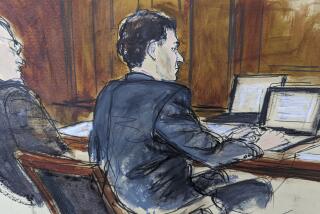Goldman Sachs case may be weakened by testimony by former hedge fund exec
- Share via
Reporting from New York — A key element of the government’s allegation of fraud is contradicted by testimony from a hedge fund executive, according to a CNBC report.
A former Paulson & Co. executive said a consulting firm hired to choose mortgage-backed bonds knew that Paulson planned to bet against them, according to a CNBC report.
—The government’s case against Goldman, Sachs & Co. appeared weaker Wednesday after a report indicated that a key element of the government’s allegation of fraud was contradicted by testimony from a hedge fund executive involved in the deal.
The Securities and Exchange Commission’s lawsuit filed Friday concerns Goldman’s creation and marketing in 2007 of a complex investment arrangement whose value was linked to a portfolio of mortgage-backed bonds. The SEC alleges in the suit that a consulting firm hired by Goldman to choose the bonds didn’t know that Paulson & Co., a hedge fund that was suggesting securities for the portfolio, planned to bet that they would lose value.
But Paolo Pellegrini, a former Paulson executive who worked on the deal, has reportedly told the government under oath that he had advised ACA Management, the firm assigned to build the portfolio, that the hedge fund would be “shorting” — betting against — the bonds placed in it.
Meanwhile, Paulson & Co.’s founder, John Paulson, told his firm’s investors in a letter Tuesday that its role in the transaction “was appropriate and conducted in good faith.”
“We have always been forthright in expressing our opinions, and we have never misrepresented our position,” he wrote.
Paulson’s letter and the reported testimony of Pellegrini could undermine the government’s case, said Marcel Cahan, a securities-law expert and professor at New York University.
“That takes a lot of the gunpowder out of the government’s case,” Cahan said. “You kind of start wondering more why the government acted as aggressively as it did.”
The SEC hasn’t alleged wrongdoing by anyone at Paulson & Co.
The agency’s complaint, filed in federal court in Manhattan, makes no reference to testimony by Pellegrini. An SEC spokesman declined Wednesday to comment on the former Paulson executive, whose statements were first reported by cable channel CNBC.
“Our case is built on a thorough evidentiary record that includes testimony, documents, handwritten notes and e-mails that will be presented in court at the appropriate time,” SEC spokesman John Nester said in a statement.
Pellegrini left Paulson & Co. in early 2009 and a spokesman for the firm said that it would not comment on his role.
The Goldman vice president who was sued along with the firm by the SEC will have a chance to testify about the deal before Congress next week. The executive, Fabrice Tourre, has agreed to appear before a Senate subcommittee alongside Lloyd Blankfein, Goldman’s chief executive, according to people close to the firm.
The SEC complaint says Goldman allowed ACA to believe that Paulson was going long — betting on the success of — the complex “synthetic” security Goldman was creating.
“Had ACA been aware that Paulson was taking a short position … ACA would have been reluctant to allow Paulson to occupy an influential role in the selection of the reference portfolio,” the government’s suit says.
ACA and Paulson employees had numerous meetings as they discussed which bonds would go into the security, known as Abacus 2007-AC1, the suit says.
A government attorney who questioned Pellegrini asked him whether he told ACA at one of those meetings that he was “interested in taking a short position in Abacus,” according to CNBC.
“Yes, that was the purpose of the meeting,” Pellegrini said, according to the network.
The government has not shared its deposition of Pellegrini with Goldman, according to sources close to the firm. Last year, Goldman told the SEC that if ACA had wanted to know Paulson’s investment position, it could have asked.
An e-mail cited in the SEC’s complaint from an ACA executive to a Goldman executive indicates that ACA was curious about Paulson’s position after one of the first meetings.
“I have no idea how [the Paulson meeting] went — I wouldn’t say it went poorly, not at all, but I think it didn’t help that we didn’t know exactly how they want to participate in the space. Can you give us some feedback?” the e-mail says, according to the complaint.
ACA has not publicly said what it knew about the stance being taken by Paulson & Co. on the bonds the firms were discussing.
Separate from the allegation dealing with ACA, the government’s lawsuit alleges that Goldman should have disclosed Paulson’s role to the investors in the deal. Goldman denies it was required to do that.
More to Read
Inside the business of entertainment
The Wide Shot brings you news, analysis and insights on everything from streaming wars to production — and what it all means for the future.
You may occasionally receive promotional content from the Los Angeles Times.










